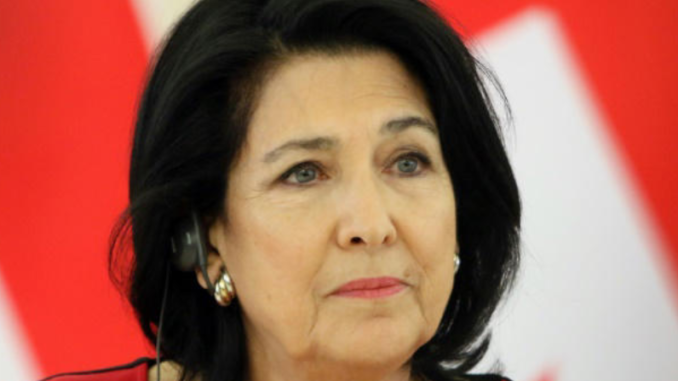
Georgia’s highest court approves the decision to oust the president.
Georgia’s constitutional court issued a ruling on Monday, asserting that President Salome Zurabishvili, who leans towards the West, had violated the constitution by making unauthorized foreign trips, thus opening the door to her potential removal from office.
In September, members of the ruling Georgian Dream party initiated proceedings to remove the 71-year-old symbolic president, contending that she had engaged in unauthorized meetings with foreign leaders to advocate for Georgia’s European Union membership, a move that lacked government authorization.
Merab Turava, the head of Georgia’s constitutional court, stated that “the president of Georgia, Salome Zurabishvili, has breached the constitution by making foreign visits without government consent.”
In response, Zurabishvili decried the court’s decision as “shameful and detrimental to the country.” She characterized the ruling party’s efforts to oust her as “an attempt to undermine Georgia’s European aspirations and democracy.” In a televised address, she emphasized that a country where the balance between different branches of power no longer exists cannot be termed a democracy.
Zurabishvili’s lawyer, Maia Kopaleishvili, expressed that the court’s ruling lacked a legal or factual basis for confirming a constitutional violation by the president.
This marked the first instance of the Georgian constitutional court addressing a president’s impeachment in the nation’s history. The parliamentary speaker announced that the impeachment vote would be conducted in the coming days.
However, the ruling party in Georgia acknowledged its limited prospects for removing Zurabishvili from office, as it holds only 84 seats in parliament, while the support of at least 100 lawmakers is required. Party chairman Irakli Kobakhidze conceded that “there are practically no chances of garnering 100 votes,” and he suggested that Zurabishvili should resign to maintain even nominal legitimacy.
Zurabishvili’s removal did not garner support from opposition parties. Charles Michel, the EU chief, met with Zurabishvili in Brussels the previous month to reiterate the EU’s commitment to Georgia’s European path and emphasize the necessary reforms for EU accession.
Georgia had applied for EU membership in tandem with Ukraine and Moldova after Russia’s incursion into its pro-Western neighbor in February 2022. While Ukraine and Moldova have been granted formal candidate status by EU leaders, Georgia has been urged to enact judicial and electoral reforms, enhance press freedom, and diminish the influence of oligarchs.
Zurabishvili criticized the Georgian Dream government for its perceived failure to meet the EU’s reform requirements. Although Georgian-Russian relations have been openly strained for years, the Georgian government, led by Prime Minister Irakli Garibashvili, took steps towards rapprochement in the past year, which sparked protests in Georgia.
Zurabishvili, the first female president of Georgia, was elected in 2018 for a six-year term with Georgian Dream’s backing but later found herself at odds with the parliamentary majority. Born in France to a Georgian family that fled the Bolshevik regime to Paris in 1921, she had a 30-year career in French diplomacy, culminating in her appointment as ambassador to Tbilisi and later as foreign minister in 2004. In her book “A Woman for Two Countries,” published in France, she expressed her reluctance to engage in politics and her sense of it being imposed upon her.

Be the first to comment